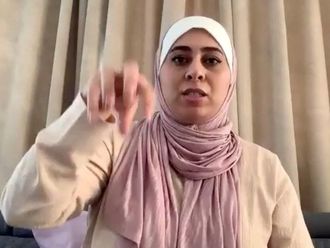Geneva, Paris: Syria peace talks due to start this week in Geneva are based on the broad mandate of a UN resolution that asks the UN mediator to hold talks on a “political transition process”, an official involved in the talks said on Tuesday.
Last week the United Nations appeared to back away from using the phrase “political transition”, which is understood by the opposition to mean a removal of President Bashar Al Assad or at least an erosion of his powers.
Michael Contet, chief of staff of Special Envoy for Syria Staffan de Mistura, told a regular UN briefing that de Mistura was putting the final touches to arrangements for the talks.
“The invitations as well as the substantive agenda for the negotiations are all based on the wide scope of Security Council resolutions, in particular (UN Security Council Resolution) 2254, which is our main guidance in this process.
“The second operative paragraph of 2254 requests the special envoy to convene formal negotiations on the political transition process.” The talks would revolve around three sets of issues, which mandates de Mistura to mediate on: establishment of a credible, inclusive and non-sectarian governance; a process for drafting a new constitution; and free and fair elections under UN supervision.
Contet declined to take questions.
The talks restart after a 10-month hiatus that has seen the opposition weakened and political upheaval among foreign powers shaping the conflict.
Since April 2016, when rival delegations were last in the Swiss city, government forces have recaptured territory including the former rebel bastion of eastern Aleppo.
Main opposition ally Turkey has forged a partnership with government-backer Russia while the United States, long the most powerful voice demanding Syrian President Bashar Al Assad’s departure, is under new and uncertain leadership.
Hopes for a breakthrough remain dim with the sides still deadlocked over Al Assad’s fate and violence on the ground persisting.
United Nations envoy Staffan de Mistura has moderated three failed previous rounds of talks and said he was not “deluded” about the prospects for a deal this time.
But he told a weekend security conference in Munich, “it is time to try again.”
Unlike 10 months ago, the rebels “have pretty much lost all leverage”, said Karim Bitar at the French Institute for International and Strategic Affairs.
Turkey, Russia and fellow regime-backer Iran have organised separate negotiations in Kazakhstan’s capital Astana, viewed as prelude to the UN talks.
After a ferocious falling out in 2015, Moscow and Ankara have mended ties and begun cooperation over Syria, including a joint campaign against Daesh.
In Munich, de Mistura said the fact that Russia and Turkey were now “talking business” on Syria was a “game-changer.”
Moscow’s military support for Al Assad has been decisive, notably in the regime’s Aleppo victory, but observers said Russia’s renewed diplomatic push could help the Geneva meet.
“The Russians have an interest in leaving this situation of endless conflict,” a European diplomatic source who requested anonymity told AFP, drawing a contrast with Iran’s “blind support” for Al Assad.
While the UN envoy may see bright spots in the new Ankara-Moscow partnership, the situation in Washington is another matter.
“Where is the US in all this? I can’t tell you because I don’t know,” de Mistura said in Munich.
During Barack Obama’s administration the US was a vocal opposition supporter and insisted Syria would not see peace with Al Assad in office.
But President Donald Trump’s administration is “re-looking at everything”, the US envoy for the anti-Daesh coalition, Brett McGurk, said in Munich, underscoring that defeating the jihadists was the top priority.
De Mistura said his diplomatic effort was “depending” on “a clear US strategy”.
That could prove disastrous for civilians caught up in the conflict which has already killed more than 310,000 people, the head of Human Rights Watch Ken Roth said.
“God help the Syrian people if we are waiting for Donald Trump to come up with a strategy”, Roth said in Munich.
During past rounds in Geneva, the government has categorically insisted that Al Assad’s fate was not up for discussion.
But, speaking in Munich, the head of the Syrian opposition National Coalition restated the rebel position that there can be no deal “as long as Al Assad remains in power”.
In a possible sign of the rebels’ isolation on the Al Assad issue, Turkey’s Deputy Prime Minister Mehmet Simsek said last month it was no longer “realistic” to insist on a solution to the Syria conflict that excluded Al Assad.
And for Aron Lund, a fellow at The Century Foundation, negotiations predicated on Al Assad immediately quitting power “were always destined to fail.”
Adding to the opposition’s fragile position is that it is expected to send a divided delegation to Geneva, including possibly some individuals who have not ruled out a deal that foresees Al Assad remaining president.
De Mistura’s office has not yet clarified the make-up of the opposition camp and has not set an end date for the round.











